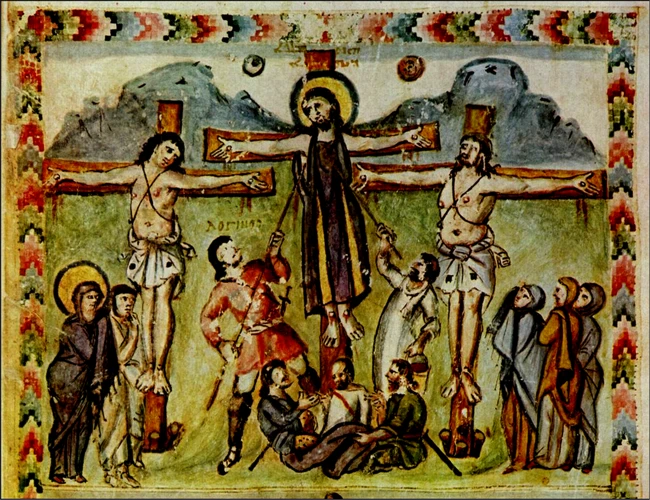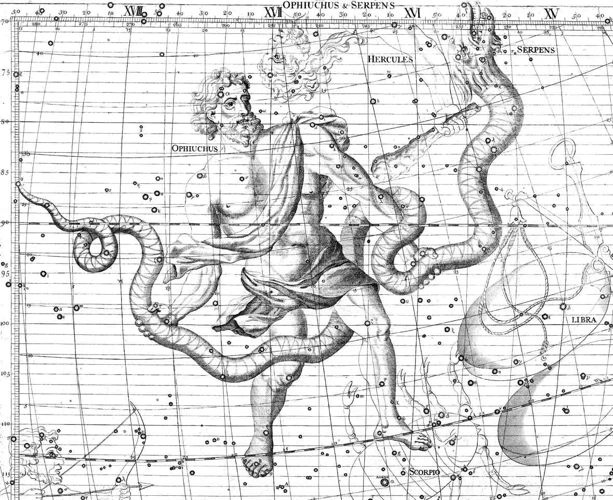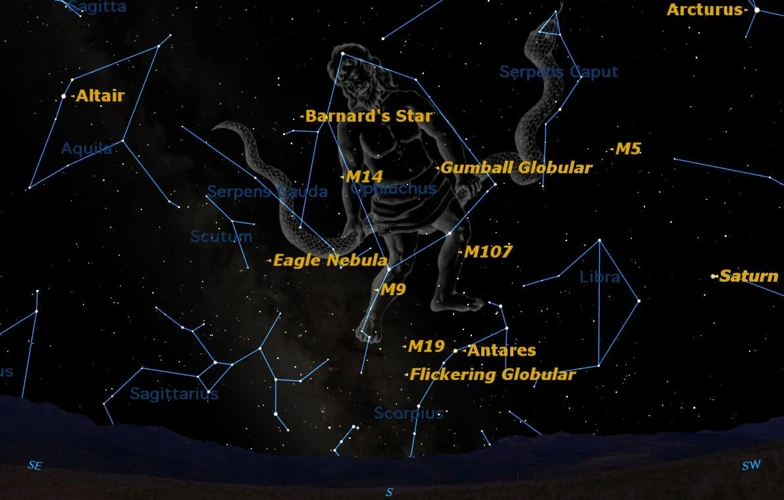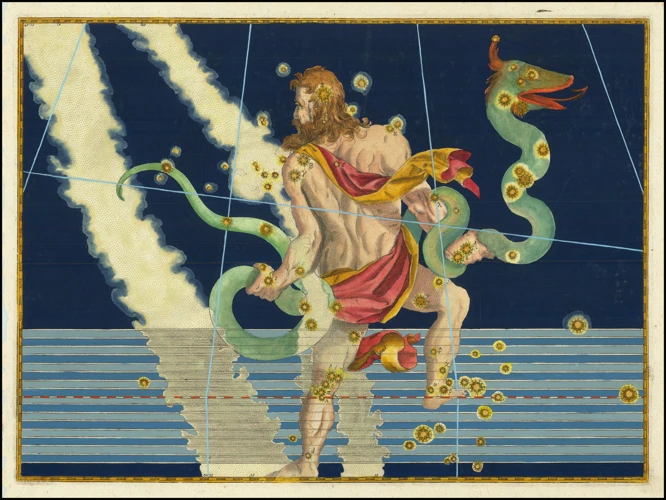Imagine a world where the constellations hold ancient secrets and untold tales. Among them, hidden in the depths of time, lies the enigmatic figure of Ophiuchus. This lesser-known constellation has captivated the imagination of civilizations throughout history, each bestowing upon it their own mythological origins. From the mystical realms of Ancient Egypt to the grand tapestry of Greek mythology, and even in the celestial calculations of Babylonian astronomy, Ophiuchus has left its mark. Join us on a journey as we unravel the hidden truths and delve into the captivating stories that surround Ophiuchus, shedding light on its origins and the significance it holds in the annals of ancient civilizations.
Contents
- Ophiuchus in Ancient Egypt
- Ophiuchus in Greek Mythology
- Ophiuchus in Babylonian Astronomy
- Ophiuchus in Native American Legends
- Unveiling the Truth
- Conclusion
-
Frequently Asked Questions
- 1. What is the significance of Ophiuchus in astrology?
- 2. Is Ophiuchus recognized in mainstream horoscopes?
- 3. Does Ophiuchus symbolize any specific qualities or attributes?
- 4. Are there any famous historical figures believed to be Ophiuchus?
- 5. How does Ophiuchus relate to serpent symbolism in ancient cultures?
- 6. Does Ophiuchus play a role in Native American mythology?
- 7. How did the ancient Egyptians view Ophiuchus?
- 8. What were the Babylonian beliefs surrounding Ophiuchus?
- 9. How does Ophiuchus’s story intertwine with Greek mythology?
- 10. What is the overall significance of Ophiuchus in ancient civilizations?
- References
-
Frequently Asked Questions
- 1. What is Ophiuchus and why is it considered a constellation?
- 2. How does Ophiuchus fit into the zodiac and astrology?
- 3. What is the mythological origin of Ophiuchus in ancient Egypt?
- 4. How is Ophiuchus connected to astrology in ancient Egypt?
- 5. Tell me about Asclepius, the healer, and his role in Greek mythology.
- 6. How do Greek myths interpret the role of Ophiuchus in the zodiac?
- 7. What stories are associated with Ophiuchus in Babylonian astronomy?
- 8. How does Ophiuchus influence astrology in Babylonian culture?
- 9. How is Ophiuchus associated with serpents and medicinal wisdom in Native American legends?
- 10. What shamanic associations are linked to Ophiuchus in Native American traditions?
- References
- Read More
Ophiuchus in Ancient Egypt

In the realm of Ancient Egypt, the fascinating tale of Ophiuchus unfolds. This mysterious figure finds its roots intertwined with the god Imhotep, known as the revered healer and architect. Imhotep, depicted with the sacred serpent, embodies the wisdom and medicinal prowess associated with Ophiuchus. The connection between the constellation and Imhotep is a celestial representation of the god’s role as a divine healer, carrying the knowledge of serpentine wisdom. The ancient Egyptians believed in the influence of the stars on human destinies, and Ophiuchus became a symbol of healing and divine guidance. As the sun traverses the constellation during the autumn equinox, the intertwining mythologies of Imhotep and Ophiuchus come to life, casting a mesmerizing spell on those who seek to understand their ancient origins.
The God Imhotep
Imhotep, the esteemed god of Ancient Egypt, emerges as a central figure in the mythological origins of Ophiuchus. Regarded as the patron of healing and medicine, Imhotep holds a revered status among the ancient Egyptians. Often depicted with a serpent intertwined around a staff, he exemplifies the power and wisdom associated with the symbol of Ophiuchus. Imhotep was not only revered for his healing abilities but was also known as the chief architect and advisor to Pharaoh Djoser. His knowledge and expertise in various fields elevated him to the status of a deity after his death. Imhotep’s association with Ophiuchus symbolizes the blending of celestial and earthly wisdom, intertwining the healing arts with the divine powers of the universe. This divine connection between Imhotep and the serpent-holding constellation captures the essence of Egyptian beliefs and their deep-rooted ties to celestial influences.
Astrological Connections
The astrological connections surrounding Ophiuchus in Ancient Egypt are deeply rooted in the belief system of the Egyptians. For centuries, the Egyptians studied the movements of the stars and their influence on human life. Ophiuchus, with its position in the zodiac, held a significant role in this astrological framework. Its placement between Scorpio and Sagittarius marked it as a celestial harbinger of transformation and spiritual growth. Those born under the sign of Ophiuchus were believed to possess extraordinary healing abilities and were seen as natural leaders and visionaries. The influence of this constellation was not limited to individuals alone; it also impacted the destiny and trajectory of entire civilizations. The alignment between Ophiuchus and prominent celestial bodies, such as the Sun, Moon, and planets, was carefully observed and interpreted by ancient Egyptian astrologers. These astrological connections provided insights into the cycles of life, and served as a guiding force in decision-making, predicting future events, and understanding the divine will. Thus, the deep-rooted astrological connections associated with Ophiuchus in Ancient Egypt enriched the lives of the Egyptians and shaped their understanding of the universe around them.
Ophiuchus in Greek Mythology

Greek mythology weaves a captivating narrative around Ophiuchus, casting it as the embodiment of the renowned healer, Asclepius. Asclepius, the son of Apollo, possessed extraordinary healing powers and was revered by mortals and gods alike. The tale of Asclepius begins with his birth, as he was brought forth from the blood of the slain Medusa, whose gaze turned men to stone. Asclepius’ exceptional healing abilities soon caught the attention of Hades, the god of the underworld, who feared that his realm would become empty as people were restored to health. In a twist of fate, Zeus struck down Asclepius with a thunderbolt, only to later immortalize him as the constellation Ophiuchus. Thus, Ophiuchus became a celestial representation of healing, transformation, and the delicate balance between life and death. The Greek mythological tapestry intricately weaves Ophiuchus into its narrative, immortalizing the connection between Asclepius and the constellation for eternity.
Asclepius the Healer
Asclepius, a prominent figure in Greek mythology, emerges as a central character in the mythological origins of Ophiuchus. Known as the god of healing and medicine, Asclepius possessed remarkable abilities to cure ailments and even bring the dead back to life. His association with Ophiuchus lies in the story of his birth. Asclepius was the son of Apollo and Coronis, a mortal woman. Coronis, unfortunately, was unfaithful to Apollo, leading him to kill her out of anger. However, he rescued the unborn Asclepius by cutting him from Coronis’ womb, and Apollo entrusted the infant to the centaur Chiron to raise and nurture. Chiron, known for his wisdom and knowledge of medicine, imparted his healing skills to Asclepius. Over time, Asclepius became a master healer, utilizing serpents in his healing rituals. These serpents would slither around his staff, known as the Rod of Asclepius, symbolizing wisdom and healing. This iconic staff with the entwined serpent has become synonymous with medicine and is even used as a medical symbol in modern times. Asclepius’ connection to Ophiuchus signifies the intertwining of healing, serpentine wisdom, and celestial influence in Greek mythology. It is a testament to the enduring legacy of Asclepius and Ophiuchus as symbols of healing and divine intervention in the ancient civilizations of Greece.
Zodiac Interpretations
The inclusion of Ophiuchus in Greek mythology gave rise to intriguing interpretations within the zodiac system. While the traditional zodiac consists of twelve signs, Ophiuchus disrupts this established pattern. Those born under the sign of Ophiuchus are believed to possess characteristics associated with healing, wisdom, and transformation. They are seen as natural healers and possess a keen intuition that allows them to navigate the depths of the human psyche. Ophiuchus represents a bridge between the preceding sign of Scorpio and the following sign of Sagittarius, symbolizing the transformative journey from darkness to enlightenment. Some astrologers believe that Ophiuchus aligns with the principles of rebirth, hidden knowledge, and spiritual awakening. It is important to note that not all astrological systems include Ophiuchus as a recognized zodiac sign. Nonetheless, the exploration of its interpretations enhances our understanding of the ancient myths and celestial symbolism that continue to captivate us to this day. For those who seek to unravel the enigma of Ophiuchus, its inclusion unveils a fascinating narrative that expands our perceptions and challenges the conventional boundaries of the zodiac.
Ophiuchus in Babylonian Astronomy

Babylonian astronomy unravels yet another layer of intrigue surrounding Ophiuchus. In the stargazing tales of the Babylonians, the constellation finds its place among a diverse collection of celestial stories. One such story tells of the hero Gilgamesh, who embarked on a quest for immortality. It is said that Ophiuchus, with its symbol of the serpent, represents the moment when Gilgamesh encounters the serpent guardian of immortality. This encounter marks a pivotal moment in the hero’s journey, a metaphorical steppingstone towards his ultimate realization. The Babylonians, renowned for their meticulous observations of the stars, recognized Ophiuchus as a celestial guide, an archetype embodying the struggle for eternal life, and a constant reminder of the mysteries lurking within the cosmos. As we explore the rich tapestry of Babylonian astronomy, we discover the profound significance of Ophiuchus, forever embedded in the annals of their celestial lore.
Constellation Stories
The constellation stories surrounding Ophiuchus have fascinated astronomers and mythologists alike. In Babylonian astronomy, Ophiuchus was associated with the god Enki, who possessed great knowledge and was depicted as a serpent. Enki’s connection to Ophiuchus symbolized the wisdom and healing capabilities of this celestial figure. In Greek mythology, Ophiuchus is linked to the story of Asclepius, a skilled healer and son of Apollo. Asclepius was known for his ability to resurrect the dead, which angered the gods and led to his placement among the stars as the constellation Ophiuchus. Native American legends also shed light on the constellation, portraying it as a sacred figure associated with serpent and medicinal wisdom. These stories highlight the universal theme of healing and knowledge that permeates the mythologies surrounding Ophiuchus. Exploring these ancient tales reveals the rich and diverse interpretations of this enigmatic constellation throughout different cultures and civilizations. (Source: https://observe.photo/index.php/origin-history-ophiuchus-symbol-astrology/)
Astrological Influence
The astrological influence of Ophiuchus in Babylonian astronomy was profound and far-reaching. This constellation, representing the serpent holder, held a significant place in the Babylonian zodiac system. In their astrological practices, the Babylonians associated Ophiuchus with the god of healing and rebirth, Nergal. Nergal was believed to possess the power to cure diseases and bring about new beginnings. People born under the influence of Ophiuchus were regarded as having exceptional healing abilities and were often sought after for their medicinal knowledge.
In Babylonian astrology, Ophiuchus was also associated with the celestial body Jupiter. Jupiter, known as Marduk in Babylonian cosmology, was considered the supreme deity and the bringer of good fortune. The alignment of Ophiuchus with Jupiter was believed to enhance the healing powers of those born under its influence and bring them great success and prosperity.
The Babylonians observed the movements and positions of the stars and planets with great precision. They used this knowledge to interpret omens and make predictions about the future. Ophiuchus played a crucial role in their astrological calculations, providing insights into matters of health, medicine, and spiritual transformation.
Ophiuchus exerted a profound astrological influence in Babylonian astronomy, connecting the divine realm with the healing arts and offering guidance and prosperity to those born under its celestial influence. The mystique and significance of Ophiuchus in ancient civilizations continue to captivate our imagination, inviting us to delve deeper into the ancient wisdom and seek a deeper understanding of the cosmos and our place within it.
Ophiuchus in Native American Legends

Embedded within the rich tapestry of Native American legends, Ophiuchus rises as a figure of great significance. In the Native American lore, the constellation of Ophiuchus intertwines with the serpent, representing both a source of medicinal wisdom and a spiritual connection to the cosmos. Native American cultures viewed serpents as powerful beings associated with healing and transformation. Ophiuchus, therefore, became a symbol of the healer, the one who possessed the knowledge of plants and herbs for medicinal purposes. The serpent’s ability to shed its skin and emerge anew further emphasized its transformative qualities in the eyes of Native Americans. Additionally, the association between Ophiuchus and shamans, who acted as intermediaries between the physical and spiritual realms, highlights the deeper spiritual undertones of this constellation. The Native American legends surrounding Ophiuchus paint a vivid and mesmerizing picture of the serpent’s significance in their cultures, offering a profound insight into their beliefs and practices.
Serpent and Medicinal Wisdom
The serpent holds a prominent role in the mythological depiction of Ophiuchus in Native American legends. Revered for its association with healing and medicinal wisdom, the serpent symbolizes the potent and transformative powers Ophiuchus possesses. Native American cultures often viewed the serpent as a sacred creature, capable of bestowing profound knowledge and transformative abilities upon those who sought its guidance. The belief in the serpent’s connection to healing comes from its ability to shed its skin, symbolizing renewal and rejuvenation—a metaphor for the healing process. This symbolism resonates deeply with Ophiuchus, as it represents the transformative energy necessary for healing and spiritual growth. Native American shamans were said to harness the serpent’s power, using it to tap into the hidden realms of knowledge and facilitate healing for their communities. This association between the serpent and medicinal wisdom highlights the profound reverence and significance of Ophiuchus in Native American cultures. The serpent’s role in Ophiuchus mythology serves as a reminder of the interconnectedness of nature, spirituality, and the healing arts, which continue to captivate our collective imagination to this day.
Shamanic Associations
Shamanic associations with Ophiuchus can be found in Native American legends, where the constellation’s significance takes on a profound spiritual meaning. In these traditions, Ophiuchus is often associated with the wisdom of serpents and the healing properties of medicinal plants. Shamans, revered as spiritual guides and healers, are believed to possess a deep connection with Ophiuchus and its energy. They harness the power represented by the constellation to invoke healing, spiritual transformation, and enlightenment. The serpent symbolism found in Ophiuchus aligns with the shamanic belief in the serpent as a potent spiritual symbol, representing rebirth, transformation, and the renewal of life. To the shamans, Ophiuchus embodies the interconnectedness of the physical and spiritual realms, a bridge between the earthly plane and the realm of spirits. Through their rituals and practices, shamans seek to tap into the celestial energy of Ophiuchus, channeling its healing and transformative powers for the benefit of their communities. This deep reverence for Ophiuchus in shamanic traditions underscores its enduring significance as a symbol of spiritual guidance and empowerment.
Unveiling the Truth

Unveiling the truth behind Ophiuchus requires a careful examination of the different mythological interpretations and historical contexts. While Ophiuchus may not be recognized as an official zodiac sign, its presence in ancient civilizations cannot be disregarded. The serpent symbolism associated with Ophiuchus has deep roots in various cultures and holds significant meanings. In Ancient Egypt, the serpent represented healing and divine wisdom, aligning with the attributes of Imhotep who was associated with Ophiuchus. In Greek mythology, Ophiuchus is linked to Asclepius, the god of medicine and healing. The intertwining of these mythological narratives showcases the enduring belief in the celestial connection to healing and medicinal knowledge. Babylonian astronomy brings forth constellation stories that highlight the mystique of Ophiuchus. Its presence in Native American legends reflects the reverence for serpentine wisdom and its association with medicinal practices. The truth behind Ophiuchus lies in its universal symbolism of healing, wisdom, and the profound connection between the cosmos and human existence. As we unravel the myths and legends surrounding this enigmatic constellation, it becomes clear that Ophiuchus holds a significant place in the tapestry of ancient civilizations, transcending time and cultural boundaries. To fully appreciate its impact, we must embrace the intertwining narratives and symbolic power it represents, shedding light on the truth that lies within its celestial embrace.
Conclusion

At the culmination of our exploration into the mythological origins of Ophiuchus in ancient civilizations, we are left with a sense of wonder and awe. Throughout our journey, we have witnessed Ophiuchus emerge as a powerful symbol, intricately woven into the mythologies of various cultures. From Ancient Egypt, where it intertwines with the divine healer Imhotep, to Greek mythology, where it represents the renowned healer Asclepius, Ophiuchus has captivated the human imagination for centuries.
In Babylonian astronomy, the constellation’s stories and astrological influence have left an indelible mark on celestial observations and calculations. Native American legends attribute to Ophiuchus serpent-like wisdom and shamanic associations, further emphasizing its significance in medicine and spirituality.
By peering into the mythological origins of Ophiuchus, we gain a deeper understanding of the interconnectedness of ancient civilizations and their shared beliefs and reverence for celestial bodies. Through these stories, we find a common thread, showcasing the enduring human fascination with the stars and our desire to find meaning in the heavens.
As we conclude our journey, we are reminded that the mythological origins of Ophiuchus are not merely relics of the past, but a testament to the enduring power of storytelling and the human quest for knowledge. The enigmatic figure of Ophiuchus continues to spark curiosity and intrigue, inviting us to explore further and unlock the secrets of our ancient past.
Through its celestial journey and the stories woven around it, Ophiuchus invites us to ponder our place in the grand tapestry of the universe and challenges us to seek wisdom, healing, and a deeper connection with the cosmos. It is a reminder that the wonders of the ancient world are still within our grasp, waiting to be discovered and cherished.
In conclusion, Ophiuchus stands as a testament to the captivating power of mythology and the enduring legacy of ancient civilizations. It ignites our imaginations, stirs our curiosity, and reminds us of the profound connections between the celestial realm and the human experience. As we continue to explore the mysteries of the universe, may we always remember the enigmatic figure of Ophiuchus, beckoning us to delve deeper into the captivating tales of the past.
Frequently Asked Questions

1. What is the significance of Ophiuchus in astrology?
Ophiuchus is considered the 13th zodiac sign in astrology, representing individuals born between November 29 and December 17. Its inclusion challenges the traditional zodiac system and offers alternative personality traits and characteristics for those born under this sign.
2. Is Ophiuchus recognized in mainstream horoscopes?
Ophiuchus is not widely recognized in mainstream horoscopes, as the conventional zodiac system is based on twelve signs. However, some astrologers and enthusiasts incorporate Ophiuchus into their interpretations, providing an expanded perspective on personality traits and astrological influences.
3. Does Ophiuchus symbolize any specific qualities or attributes?
Ophiuchus symbolizes wisdom, healing, and the power to traverse realms between the physical and spiritual. People associated with this sign are often seen as seekers of truth, with a deep connection to the healing arts and a natural inclination to explore the mysteries of the universe.
4. Are there any famous historical figures believed to be Ophiuchus?
While it is impossible to accurately determine an individual’s zodiac sign without their birth date, some speculate that renowned figures such as Imhotep, Nikola Tesla, and Carl Jung may have embodied the qualities associated with Ophiuchus.
5. How does Ophiuchus relate to serpent symbolism in ancient cultures?
Throughout ancient civilizations, serpents were often associated with healing, knowledge, and transformation. Ophiuchus, represented by the serpent, symbolizes the connection between earthly and spiritual realms, carrying the wisdom of the serpent as a guide to navigate these realms.
6. Does Ophiuchus play a role in Native American mythology?
While Ophiuchus is not explicitly mentioned in Native American mythology, several tribes had serpent-related deities associated with healing and wisdom. The serpent’s symbolism shares similarities with the qualities attributed to Ophiuchus in other mythologies.
7. How did the ancient Egyptians view Ophiuchus?
Ancient Egyptians revered Ophiuchus as a celestial representation of the god Imhotep, the divine healer and architect. Imhotep’s connection to serpentine wisdom and healing arts aligned with the qualities attributed to Ophiuchus, making it an important symbol in Egyptian cosmology.
8. What were the Babylonian beliefs surrounding Ophiuchus?
In Babylonian astronomy, Ophiuchus was associated with the serpent god Ningishzida, who held the power to grant immortality. Babylonians believed in the influence of celestial bodies on human destinies and looked to Ophiuchus as a source of astrological guidance and understanding.
9. How does Ophiuchus’s story intertwine with Greek mythology?
In Greek mythology, Ophiuchus is often associated with Asclepius, the god of medicine and healing. Asclepius, depicted as a skilled healer holding a serpent-entwined staff, symbolizes the wisdom and mastery of medicine that aligns with the healing aspects of Ophiuchus.
10. What is the overall significance of Ophiuchus in ancient civilizations?
Ophiuchus holds a significant place in ancient civilizations as a symbol of healing, wisdom, and the interconnectedness between the physical and spiritual realms. Its presence in various mythologies and astrological beliefs highlights the universal recognition of these fundamental aspects of human existence.
References
Frequently Asked Questions

1. What is Ophiuchus and why is it considered a constellation?
Ophiuchus is a constellation located near the celestial equator. It is often referred to as the “Serpent Bearer” and represents a figure from Greek mythology. It is considered a constellation because it is a group of stars that form a recognizable pattern in the sky.
2. How does Ophiuchus fit into the zodiac and astrology?
Ophiuchus is not traditionally part of the zodiac in Western astrology. The zodiac consists of twelve signs, but Ophiuchus is often referred to as the “13th sign.” However, some astrologers have started to incorporate Ophiuchus into their interpretations, considering it a significant influence on personality traits and life events.
3. What is the mythological origin of Ophiuchus in ancient Egypt?
In ancient Egypt, Ophiuchus is associated with the god Imhotep. Imhotep was a renowned physician and healer who later became deified. The constellation of Ophiuchus is believed to represent his divine connection and his ability to bring healing and wisdom to the world.
4. How is Ophiuchus connected to astrology in ancient Egypt?
Ophiuchus was not explicitly connected to astrology in ancient Egypt. The Egyptian astrological system focused more on the movement and significance of the planets rather than the constellations. However, since Imhotep, associated with Ophiuchus, was regarded as a divine figure with healing and wisdom, some astrologers speculate that his influence might have been considered in astrological interpretations.
5. Tell me about Asclepius, the healer, and his role in Greek mythology.
In Greek mythology, Asclepius was a son of Apollo and a skilled healer. He was known for his ability to bring the dead back to life, which angered Zeus. As a punishment, Zeus struck him down with a lightning bolt, but later placed him among the stars as the constellation of Ophiuchus, honoring his healing abilities.
6. How do Greek myths interpret the role of Ophiuchus in the zodiac?
Greek interpretations of the zodiac do not traditionally include Ophiuchus as one of the twelve signs. However, those who incorporate Ophiuchus suggest that individuals born under this sign possess healing qualities and display wisdom and insight in their lives.
7. What stories are associated with Ophiuchus in Babylonian astronomy?
In Babylonian astronomy, Ophiuchus is associated with various stories and myths. One such story involves the hero Gilgamesh, who ventures into the underworld and encounters the divine healer, also represented by the constellation. These stories depict Ophiuchus as a symbol of healing, life, and knowledge.
8. How does Ophiuchus influence astrology in Babylonian culture?
Like in Greek astrology, Ophiuchus is not officially recognized as one of the zodiac signs in Babylonian astrology. However, some astrologers consider it an influential constellation that represents knowledge, healing, and other traits linked to the hero and healer figures in Babylonian mythology.
9. How is Ophiuchus associated with serpents and medicinal wisdom in Native American legends?
In Native American legends, Ophiuchus is often associated with serpents and the understanding of medicinal wisdom. The constellation represents the connection between serpents and healing practices, emphasizing the importance of natural remedies and spiritual healing in Native American cultures.
10. What shamanic associations are linked to Ophiuchus in Native American traditions?
In Native American traditions, there are shamanic associations with Ophiuchus. Shamans, considered spiritual healers and guides, connect with the energy of Ophiuchus to access deep healing wisdom and help individuals navigate their physical, emotional, and spiritual well-being.







